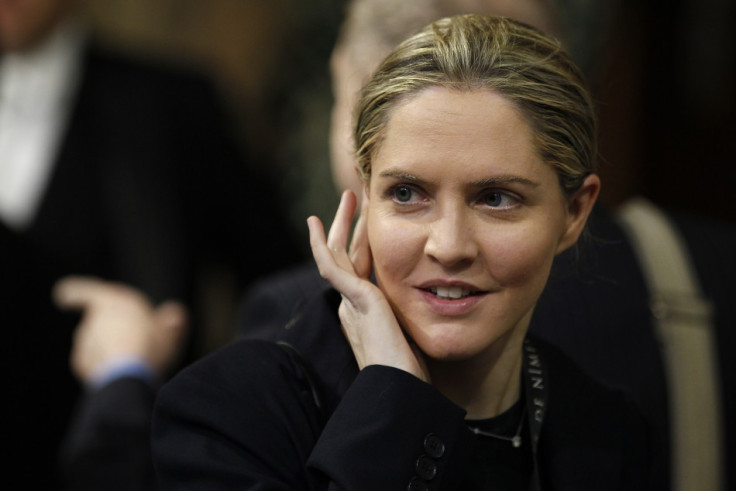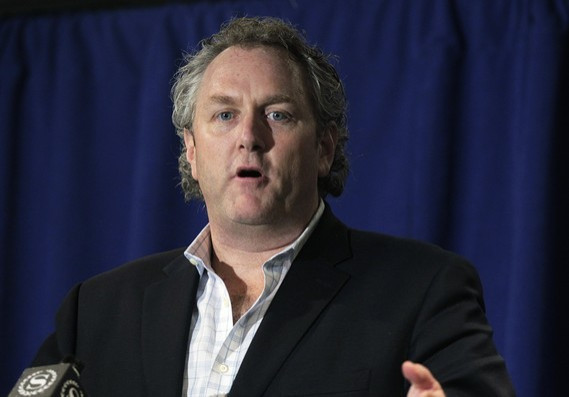Just what did Louise Mensch say on the weekend? From super powers to Putin murdering Breitbart
Full transcript of Mensch's interview with Andrew Neil on BBC One's Sunday Politics show.

US-based journalist and former Conservative MP Louise Mensch had a heated exchanged with veteran presenter Andrew Neil over the weekend. Mensch, appearing on BBC One's Sunday Politics show, defended her "belief" that Russian President Vladimir Putin was behind the 2012 death of right-wing media entrepreneur Andrew Breitbart.
The ex-editor of News Corporation's Heat Street also explained her "superpowers". You can read the full exchange between Mensch and Neil below.
Andrew Neil: She wrote that the FBI had been granted a warrant to intercept communications – she didn't talk about wiretaps – between Trump's campaign and two Russian banks...Louise Mensch, you claimed in early November that the FBI had secured a court warrant to monitor communications between Trump Tower in New York and two Russian banks. It's now four months later, isn't the case that nobody has proved the existence of this warrant?
Louise Mensch: First of all, forgive me Andrew, one takes one's life in one's hands when it's you, but I'm going to have to correct your characterisation of my reporting...I did not report that the FBI had a warrant to intercept anything or that Trump Tower was any part of it.
What I reported was: The FBI obtained the warrant targeted on all communications between two Russian banks and were therefore allowed to examine US persons in the context of that investigation, what the American's call legally "incidental collection".
I certainly didn't report that the warrant was able to intercept, or that it had a location basis, for example Trump Tower, I just didn't report that. And the reason that that matters so much is because I now believe that there may – based on the president's reaction – there may well be a wiretap at Trump Tower.
If so, Donald Trump has just tweeted out evidence in an ongoing criminal case that neither I nor anybody else reported...and he's right about Watergate because he will have committed obstruction of justice directly from his Twitter account.
Neil: Let me come back to what the question was: We have not yet got proof – evidence – that this warrant exists, do we?
Mensch: No and you're most unlikely to get it because it would be a heinous crime for Donald Trump to reveal its existence. In America they call it Glomar response – I can neither confirm nor deny – that's what all American officials will have to say legally.
So if you're looking for proof you won't get it until or unless a court case is brought. But that doesn't mean it doesn't exist.
The BBC validated this two months after me in their reporting by the journalist Paul Wood and The Guardian, the journalist Julian Borger, also separately from his own sources validated the existence of the warrant and if you're in America you would know that CNN and others are reporting that the investigation is ongoing.
Neil: OK, let me come onto the wider point. You believe, I think, that the Trump campaign, including the president, were complicit with the Russians during the 2016 election campaign to such an extent that Mr Trump should be impeached. What evidence do you have for that?
Mensch: There's an absolutely enormous mound of evidence. You could start with him saying: 'Hey, Russia, if you're listening, please release all of Hilary Clinton's emails...'
Neil: That's not evidence.
Mensch: I think it rather is actually, especially if you look at some of the evidence that exists on Twitter and elsewhere of people talking directly to his social media manager, Dan Scavino, and telling him to do that before it happened.
There's quite a bit out there and the BBC itself reported that in April of last year a six-agency taskforce – not just the FBI, right down to the Treasury department – was looking at this so I believe there's an enormous amount of evidence and, of course, there's the [Christopher] Steele dossier, which was included in an official report of the US intelligence community...
Breitbart's death
Neil: So, just to be clear, we don't really have hard evidence yet whether this warrant exists – it may or it may not – there's lots of claims, whether there's evidence about Mr Trump and the Russians is another matter and you've also claimed [that] President Putin had Andrew Breitbart murdered to pave the way for Steve Bannon, this is the man who founded the Breitbart website, to pave the way for Steven Bannon to play a key role in the Trump administration.
Mensch: No I haven't.
Neil: You then said Mr Bannon was behind bomb threats to Jewish community centres, aren't you in danger of just peddling wild conspiracy theories?
Mensch: No, first of all, I haven't. And no matter how many times people say this it's not going to be true. I said on Twitter in a tweet I believe that to be the case about the murder of Andrew Breitbart
Neil: That's what I just said. You believe President Putin murdered him.
Mensch: Andrew, I believe it, you said I reported it – those are two completely different things.

Neil: ...you don't have a shred of evidence.
Mensch: I do. Indeed, I made no assertion, I said what I believed, there is a difference.
Neil: You may believe there's fairies at the bottom of your garden, [but] it doesn't make it true.
Mensch: If I say so, then that's my belief. If I say 'I am reporting', as I did with the FISA warrant – that a FISA warrant exists – you may rest assure that I have a basis in fact for a report. A belief is just a belief.
Neil: I know you're relatively new to journalism, so let me just get the rules right: if it's Twitter we don't believe it, but if it's on your website we should believe it.
Mensch: If I report something and I say this happened, then I'm making an assertion. If I describe a belief, I'm describing a belief. I know subtlety may be a little difficult for you, but there's a difference between a report and a belief.
Neil: If you want to be a journalist, beliefs have to be backed up by some evidence.
Mensch: Really...do you have a faith?
Neil: Well, it's not a matter of faith or maybe in your case that President Putin murdered Andrew Breitbart.
Mensch: A belief and a report are two different things and no matter how often you say they are the same, they will never be the same.
Superpowers
Neil: You've said in today's Sunday Times here in London that you've turned into, I quote your word, that you're a 'temporary superpower', where, you quote, see things 'really clearly'. Have you become delusional?
Mensch: No, I'm describing a biological basis for ADHD [Attention deficit hyperactivity disorder], which I have, which any of your viewers [who] are doctors will know provides people with, unfortunately, a lot of scattered focus – they're very messy, absent minded I profess – but when they're interested in things and they have ADHD they can have a condition called hyper-focus, which means that you concentrate very hard on a given subject and you can see patterns and connections. That's biological and I don't resile from it for a moment.
© Copyright IBTimes 2025. All rights reserved.






















